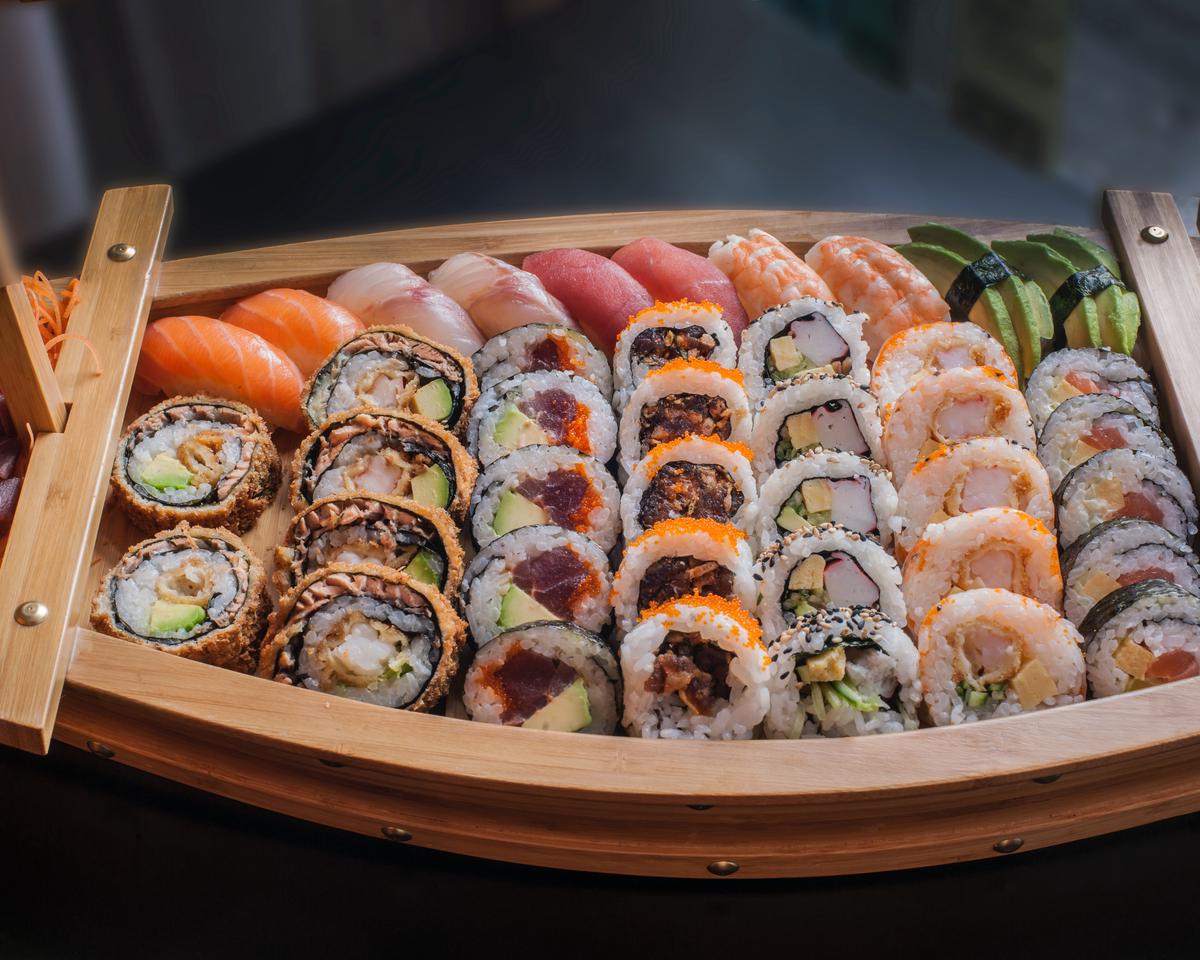Sushi, originally a cheap street food, is now an iconic global delicacy and a driving force in the Japanese economy. This seemingly simple food has had a well-founded cultural, social, and economic impact on Japan and the world over the centuries. Sushi is not only a symbolic representative of Japanese cuisine, but also a key player whose dynamic history and position in the global food industry shows how food, business and culture influence and shape each other. From the bustling streets of the Edo period to today’s bustling international hotspots, sushi takes us on a fascinating journey of cross-cultural connection, economic growth, and sustainable innovation.
History of sushi and its economic importance
Sushi, the culinary hero of Japan, has long conquered the global palate and is now a fundamental part of the gastronomic scene. However, it wasn’t always so glamorous. The journey of sushi, from simple street food to high-end menus in posh restaurants worldwide, is quite fascinating.
In the past, sushi was more of a food preservation tool than a sought-after treat. The fermented fish was placed between layers of rice and then kept for months. The meaning of sushi has changed a lot over time.
The value added of the sushi industry in Japan in 2015 was an impressive 1.53 trillion yen, equivalent to about $14 billion. Today, sushi plays a crucial role in the Japanese economy and is a pride for Japanese culture. More importantly, sushi is also a driving force of tourism in Japan. Numerous tourists flock to Japan every year just to experience the authenticity and unique presentation of sushi.
Sushi has established itself as a steadfast player in the foodservice industry, paving the way for a variety of sushi bars, restaurants, and delivery services. In addition, the increasing prevalence of sushi has led to an explosion of sushi cooking classes, which not only give people the ability to make their own sushi but also expose them to Japan’s rich culture and history.
Not only does sushi represent the culinary artistry of Japan, but it has also had a profound impact on the worldwide dissemination of Japanese culture and has made an important contribution to the global economy and hospitality sector. It is therefore safe to say that the importance of sushi goes far beyond its traditional role as a simple food. It is a symbol of creativity and innovation in the culinary world and proof that food is truly a universal language.

Sushi Tourism in Japan
Sushi, this dainty yet powerful ambassador of Japanese culture, is much more than just a culinary delight. In fact, sushi has played a significant role in Japan’s tourism industry, with the country experiencing remarkable growth in sushi tourism. From luxury sushi restaurants in Tokyo to sushi cooking classes for tourists, sushi has a significant impact on Japan’s economy and the global tourism market.
One of the strongest trends is “eatertainment” – the concept of using food as entertainment. More and more tourists are planning their trips around culinary experiences, and sushi is at the top of many people’s lists. This has encouraged the development of sushi theme parks, sushi tours, and other sushi-related attractions.
At the same time, the rising popularity of sushi is leading to an increased demand for sushi raw materials, especially high-quality fish. This has a significant impact on Japan’s fishing industry, which is increasingly seeking to promote and support sustainable fishing practices. For example, raw fish auctions at fish markets such as Tsukiji and Toyosu make up a significant part of Japan’s economy.
Another aspect of sushi tourism is the promotion of regional cuisines. It’s a common misconception that all sushi is created equal. In fact, there are numerous regional sushi variations in the different regions of Japan. By promoting these regional sushi styles, lesser-known regions can attract tourists, thus strengthening their local economies.
Sushi also has a huge impact on Japan’s food culture. Skills such as the proper preparation of sushi rice, the proper beating of fish, and the proper shaping of the sushi are highly valued and contribute to the cultural identity of the country. In addition, as part of culinary tourism, sushi promotes the spread of omotenashi, the Japanese spirit of hospitality, in the world.
After all, sushi also affects Japan’s position in the world market. With the booming sushi tourism, Japan has established itself more and more as a culinary destination, positioning the country and its gastronomy on the world stage. This not only contributes to Japan’s economy, but also strengthens the country’s image in the world.
In this way, sushi plays an essential role in Japan’s economy and tourism industry. By being able to combine culture, artistry and world-class cuisine in a single bite, sushi has proven its universal appeal and firmly anchored its position as a global culinary ambassador.

Globalization of Sushi and Impact on Japan
The increasing globalization of sushi is having a significant impact on the Japanese economy. Key factors include the popularity of sushi as an ambassador of Japanese culture and the exponential growth of tourism, fueled by the spread of the sushi concept of “eatertainment” and culinary journeys.
Sushi theme parks, tours, and other attractions are growing in popularity, further boosting tourism. The attractions attract international attention and help keep Japan attractive as an exotic destination. Tourism generates significant revenue for the communities that host these attractions, thus strengthening the local economy.
The increasing global demand for sushi is also having a significant impact on the fishing industry. The demand leads to increased fish production and the corresponding export of these goods, which boosts Japan’s economy.
The promotion of regional sushi cuisines has created a synergy between traditional cuisine and local economic power. This combination has helped raise awareness of regional sushi specialties and promote locally produced foods.
Sushi also plays a central role in Japan’s food culture and cultural identity. It contributes to the formation and maintenance of a unique culinary identity that represents the country on the global stage.
The spread of omotenashi, traditional Japanese hospitality, through culinary tourism and sushi is another trending topic. It underscores Japan’s status as a leader in global gastronomy and strengthens the country as a destination for foodies and culture lovers.
Finally, the global influence of sushi strengthens Japan’s position in the world market. As a culinary ambassador for Japan, sushi helps raise the country’s profile and positions it as a hub for culinary enjoyment and innovation. It has universal appeal and is enjoyed worldwide – a phenomenon that has a significant impact on the Japanese economy.
This shows that the globalization of sushi goes far beyond simply providing a meal. It is a powerful tool for cultural understanding, tourism, and economic development. It is a culinary ambassador that draws attention to the unique aspects of Japanese culture while strengthening the country’s economy.

Sustainability and the sushi industry
An enchanting aspect of sushi lies in its ability to combine tradition and innovation – a core part of its timeless appeal. The deep respect for the natural beauty and essence of the ingredients, mixed with the vision for bold, exciting flavors, sets sushi as a trend-setting element in the culinary world.
The topic of sustainability in the sushi industry, which is central in today’s world, opens up a different perspective. Industrial fishing has put pressure on the marine ecosystem, upsetting the balance of the oceans and threatening the sustainable availability of fish reserves. This, in turn, evokes a high level of responsibility among sushi professional chefs and enthusiasts. The use of sustainably grown seafood and support for restraining practices is highly valued.
A positive spillover effect of this is the focus on locally grown, seasonal ingredients. This practice not only strengthens local agriculture, creates jobs and invigorates local economies, but also promotes the diversity and authenticity of sushi cuisine. Likewise, new sushi styles and variants are emerging, each with a unique historical and cultural context, which in turn expand the rich palette of sushi.
Sushi fusion cuisines that combine Japanese flavors with international influences are also in vogue. They allow for a more diverse, creative interpretation of sushi and open up possibilities for culinary expressions. Not only is sushi being reinvented in an innovative way, but cultures are also integrating and creating a symbiosis of taste and experience.
The growing movement of vegan and vegetarian cuisine is also having an impact on the sushi industry. Although fish is traditionally a main ingredient in sushi, mushrooms, fermented vegetables and other alternatives are a new trend. Vegetarian and vegan sushi are not only keeping up with demand, but also accentuating the visual and sensory delights of sushi in a new, exciting way.
In conclusion, the sushi industry, in its constant balance between tradition, innovation, and sustainability, maintains an unbreakable connection to its cultural heritage while navigating the waves of change. Sushi not only remains an ambassador of Japanese culture and culinary prowess, but also plays a key role as a trendsetter and thought leader in society and the economy. With their deep-rooted respect for origin, their ongoing search for culinary delights and their sense of aesthetics, the fascination and passion for sushi will continue worldwide for a long time to come.

Sushi nowadays is more than a food, it is an economy and culture in itself. With its increasing global importance and popularity, sushi carries much more than just culinary pleasure, it also moves economies and shapes social landscapes. The impact can be seen in the robust sales increases, tourism figures, and sustainable practices within the sushi industry. It is the pursuit of a balance between tradition and innovation, sustainability and capital that defines the heart of the sushi industry and ensures its continued relevance. It is with this awareness that we should value sushi far more than a delicious meal – it is a reflection of the respectful harmony that Japan shares with the world, and a testament to the endless possibilities that the economic and cultural fusion of food can offer.


